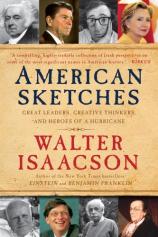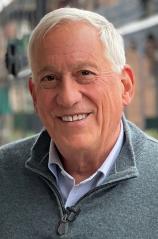American Sketches: Great Leaders, Creative Thinkers, and Heroes of a Hurricane
Review
American Sketches: Great Leaders, Creative Thinkers, and Heroes of a Hurricane
In a career that has spanned more than a generation and has
taken him from his early days as a city hall beat reporter in his
native New Orleans to the pinnacle of American journalism as
managing editor of Time magazine and then Chairman and CEO
of CNN, Walter Isaacson has occupied a unique vantage point from
which to observe this period of American history. Along the way, he
has found time to produce critically-praised and popular
biographies of Henry Kissinger, Benjamin Franklin and Albert
Einstein. Now in AMERICAN SKETCHES, Isaacson collects some 40
examples of his writing, from personal essays to reviews to pieces
culled from Time that, taken together, construct a
revealing mosaic of what might be described as modern American
liberalism.
Anything but a dewy-eyed idealist (he jokes that his fellow
liberals “are congenitally more comfortable humming the theme
of All Things Considered than the theme of
Crossfire”), Isaacson is insistent that liberal
values, such as the free exchange of ideas, pluralism and rational,
evidence-based decision making, are crucial to America’s
well-being. Above all, he concludes that “the need to
calibrate a proper balance among opposing principles is evident in
every issue we face today, from abortion to health-care reform to
affirmative action.”
A sizable cross section of the book is devoted to writings on
his three biographical subjects, each subtly disclosing a different
aspect of this worldview. He lauds Benjamin Franklin as a paragon
of the American virtue of compromise, even going so far as to find
a healthy dose of that quality embodied in our current president.
For anyone who hasn’t read Isaacson’s exhaustive
biography of Albert Einstein, the six pieces here, including ones
discussing Einstein’s view of God, his indirect but critical
role in the development of the atomic bomb, and the essay
introducing him as Time’s “Man of the
Century” make a persuasive case for his unabashed admiration
of the brilliant scientist and humanist. Though he’s quick to
spotlight Henry Kissinger’s faults, Isaacson’s
pragmatic outlook on American foreign policy comes through in his
grudging admiration for the former secretary of state’s brand
of realpolitik.
Whether it’s new media or biotech, Isaacson is an
enthusiast about emerging technologies, and among the five pieces
in a section entitled “The Age of Technology,” he
offers a substantial, balanced appraisal of Bill Gates along with a
profile of his equally tough-minded competitor, Andrew Grove of
Intel. Although he has chosen to present the piece in the section
“Journalism,” Isaacson argues convincingly and from the
point of view of one immersed in the world of print journalism for
a new system that will allow online media to evolve from what he
believes is a failed advertising model to one based on readers
paying modest sums for content --- what he calls
“micropayments.”
In any volume of this size and diversity, there are bound to be
a handful of ill-chosen entries. The pieces on Reagan and Gorbachev
have something of a dated feel, like an album of musty photographs
dragged out by an elderly relative. Likewise, the transcript of an
extended interview with Woody Allen focusing on his relationship
with Mia Farrow’s adopted daughter and the allegations of
sexual abuse Farrow lodged against him (the interview in which
Allen famously justified his actions by stating “The heart
wants what it wants”) strikes a discordant note in the
distinguished company of Isaacson’s worthier subjects.
But the book concludes stirringly with a passionate group of
essays on New Orleans. While he has traveled the world, it’s
apparent that Isaacson’s heart has never strayed far from his
hometown, where he has returned some 20 times since Hurricane
Katrina. He likens the “easy lethargy” of the
city’s recovery to culinary specialties like Creole gumbo and
Cajun jambalaya, “which involve a variety of ingredients and
spices that are blended slowly.” And he offers a moving
tribute to another one of its native sons, Louis Armstrong (his
next biographical subject), who “stands as a rebuke to the
great scourge of history and of our world today: the tribalism that
pits people of different religions, races, and ethnicities against
one another.”
In this wide-ranging anthology, Walter Isaacson demonstrates
much of what is praiseworthy about American journalism at its best.
“Good narrative storytelling,” he observes, “can
bind us together, provoke shared sentiments, and evoke our common
underlying values.” If he and other generous and fair-minded
journalists like him can make their voices heard above the bedlam
of the 24/7 news cycle to inspire the next generation of their
profession, that's reason to hope that the survival of the liberal
democracy he cherishes will be assured.
Reviewed by Harvey Freedenberg (mwn52@aol.com) on January 5, 2011
American Sketches: Great Leaders, Creative Thinkers, and Heroes of a Hurricane
- Publication Date: November 2, 2010
- Genres: Biography, Current Affairs, History
- Paperback: 304 pages
- Publisher: Simon & Schuster
- ISBN-10: 1439183449
- ISBN-13: 9781439183441





